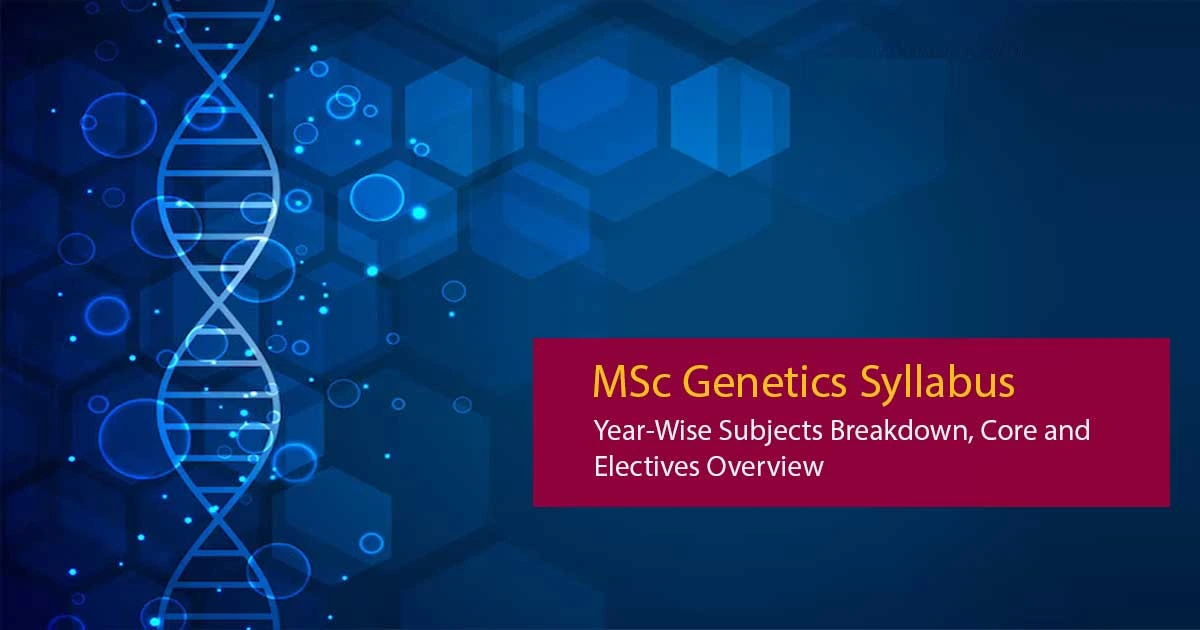Blog Detail


MSc Genetics Syllabus: Year-Wise Subjects Breakdown, Core and Electives Overview
24-04-2025

The field of genetics has grown exponentially over the last few decades, thanks to advancements in molecular biology, biotechnology and genomics. For students who aspire to explore the intricacies of heredity, gene expression and DNA technologies, pursuing an MSc in Genetics can be a gateway to a future in cutting-edge scientific research and applied healthcare. One of the first steps towards understanding the academic path is to explore the MSc Genetics syllabus, its structure, and subject focus over the two-year study period.
This article provides a detailed overview of the MSc Genetics subjects, year-wise syllabus distribution and a clear distinction between core and elective subjects, offering prospective students a transparent understanding of the programme.
MSc Genetics Syllabus: An Overview
The MSc Genetics syllabus is designed to provide an in-depth understanding of the molecular mechanisms underlying heredity, genetic variation and gene function. Structured over two academic years, the course combines theoretical knowledge with laboratory techniques, preparing students for research, diagnostics and teaching roles. It also introduces key computational tools used in modern genetic analysis.
The programme is typically spread across four semesters, with core modules in the initial year and more flexibility offered through electives in the second year. The curriculum is continuously updated to align with current scientific advancements and industry needs.
MSc Genetics First Year Syllabus
The MSc Genetics first year syllabus builds a strong foundation in classical and molecular genetics, cell biology and genetic engineering. Students are introduced to the principles of gene regulation, DNA replication, mutation mechanisms and chromosomal behaviour.
Core Focus Areas:
- Molecular Genetics
- Cell and Developmental Biology
- Principles of Genetic Engineering
- Microbial Genetics
- Biostatistics and Bioinformatics
- Research Methodology and Scientific Communication
Laboratory sessions in the first year are designed to train students in molecular cloning, DNA extraction, electrophoresis and gene expression analysis. This hands-on experience is integral to the learning process, enhancing competence and confidence in working with genetic material.
MSc Genetics Second Year Syllabus
In the second year, students dive deeper into advanced topics and gain the opportunity to tailor their academic experience through elective modules. The MSc Genetics second year syllabusemphasises the application of genetic principles in real-world scenarios, including healthcare, agriculture and biotechnology.
Key Subject Areas:
- Human Genetics
- Population and Evolutionary Genetics
- Genomics and Proteomics
- Plant and Animal Biotechnology
- Medical Genetics
The final semester typically includes a dissertation or research project, encouraging students to conduct original research under the guidance of their faculty. This project facilitates the integration of knowledge across various domains, enabling students to develop a research-oriented mindset.
MSc Genetics Core Subjects
- The MSc Genetics core subjects ensure that every student acquires essential knowledge and practical skills in foundational areas of genetics. These subjects are mandatory and form the backbone of the programme. They include:
- Molecular Genetics
- Cell and Developmental Biology
- Genetic Engineering
- Human Genetics
- Research Methodology
These modules are complemented by intensive lab sessions, data analysis tasks and scientific writing components to build a well-rounded academic and professional profile.
MSc Genetics Elective Subjects
The second year introduces MSc Genetics elective subjects, which enable students to explore niche areas of interest and align with their career goals. Electives are generally offered in the emerging regions of genetics and interdisciplinary fields such as:
- Cancer Genetics
- Neurogenetics
- Environmental and Conservation Genetics
- Agricultural Genomics
- Immunogenetics
Electives are designed to align the programme with contemporary research trends, enabling students to remain relevant in a rapidly evolving scientific landscape.
Skill Development and Research Orientation
Students are encouraged to develop analytical, critical thinking and research skills throughout the course. Workshops, seminars and conferences are integral to the curriculum, providing exposure to real-world genetic research and innovations. Additionally, bioinformatics training ensures students can handle large-scale genetic data and use computational tools efficiently.
Career Prospects After MSc Genetics
MSc graduates are well-positioned for careers in research laboratories, hospitals, biotech companies, agricultural institutes and academic organisations. The curriculum is designed to meet academic excellence and foster practical expertise, making MSc Genetics graduates highly sought-after professionals.
The opportunities are vast and rewarding, from working on genetic disorders to contributing to conservation efforts and improving crop traits.
Conclusion
The MSc Genetics syllabus is a comprehensive blend of theory, experimentation and innovation. With a strong foundation established in the first year and opportunities for specialisation in the second year, students are well-equipped to tackle real-world genetic challenges. Understanding the detailed breakdown of MSc Genetics subjects, including core and elective modules, helps students make informed decisions about their academic journey and career path.
Whether you are interested in molecular research, healthcare, or environmental genetics, this programme offers the breadth and depth needed to thrive in the field of genetic sciences.
FAQs
Q1. Is MSc Genetics a good career?
A1. Yes. MSc Genetics is considered a strong career choice due to its applications in healthcare, agriculture, pharmaceuticals, and research. It opens doors to roles such as genetic counsellor, clinical researcher, biotechnologist and academician.
Q2. Is genetics hard to study?
A2. Genetics can be intellectually challenging, as it involves understanding complex biological systems and analytical techniques. However, with structured learning, strong faculty support and practical exposure, students often find it deeply rewarding.